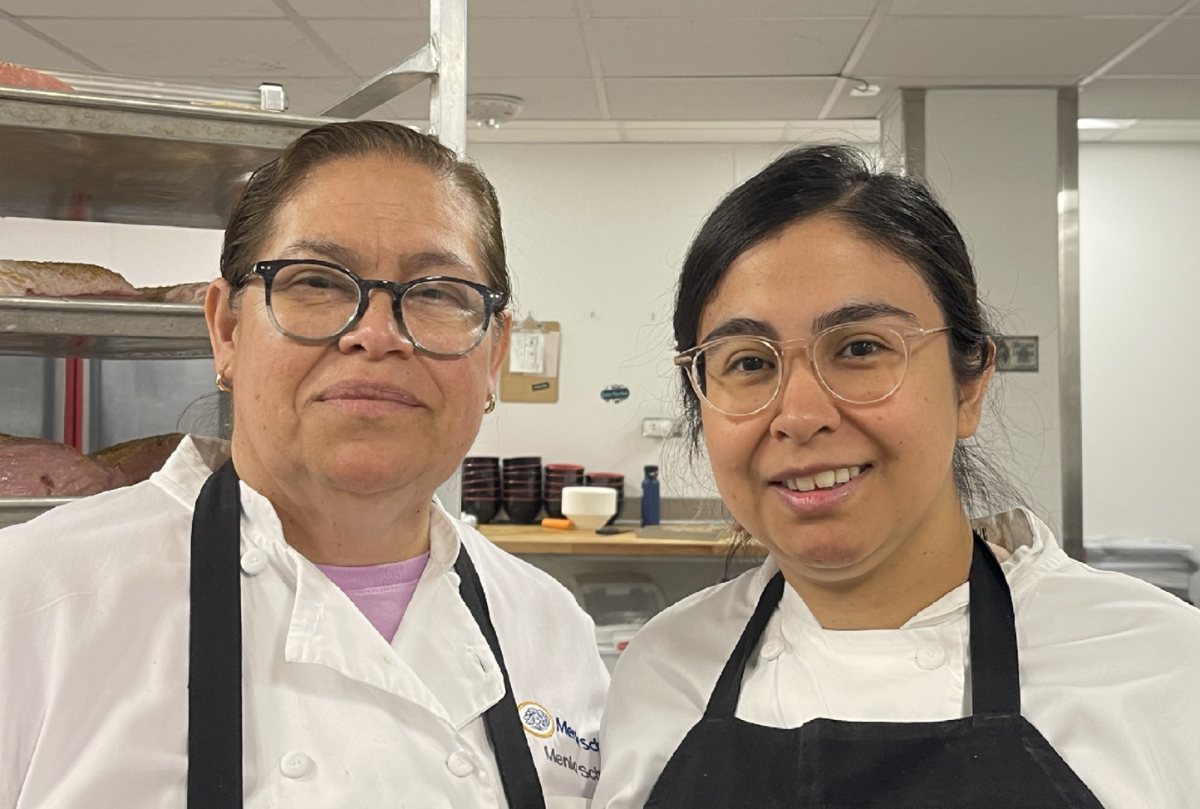The Menlo kitchen brims with locally sourced food from the Pacific coast, fruits and vegetables from the Garden Club and repurposed meals made using ingredients that would otherwise go to waste.
According to FLIK Director of Dining Services Thien Hoang, the company tries to purchase all of Menlo’s food within 150 miles of the school. Roughly 80% of the produce comes from the Salinas Valley and Monterey Bay areas and all proteins are sourced locally. “We do pay a higher premium for that [food], but it’s better for the environment and […] greenhouse emissions aren’t as bad and we’re buying locally,” Hoang said.
Buying local foods also ensures freshness as opposed to buying food abroad. “Not only is it not as effective to buy beef from Australia [than to buy locally], when you get beef from Australia, you gotta pack it, ship it, send it, you know, so it’s just never going to be as fresh or as good as we can get it here,” Hoang said.
Meanwhile, foods that cannot be mass produced in California, such as mangoes and avocados, are sourced from Mexico. Most foreign food is sent by produce companies by plane, especially those based in Mexico, while local food arrives by truck.
In terms of seafood, FLIK also only buys seafood that is listed as green or ‘Best Choice’ on the Monterey Bay Aquarium’s Seafood Watch list. This list displays the most sustainable options for seafood and endangered marine animals. Hoang believes that most of the fish they buy is native to Alaska, like codfish, while salmon is locally harvested up and down the West Coast in places such as Oregon.
The Garden Club gives some of the extra fruits and vegetables that are grown in their garden to the kitchen. According to Garden Club leader and senior Arthi Abhyanker, the Garden Club provides the kitchen with more produce during the fall when more of their fruits and vegetables are in season. “The last thing we gave to the kitchen was potatoes, which they used to make home fries,” Abhyanker said.
FLIK also practices sustainability when it comes to food waste. Menlo has very little food waste in the kitchen due to FLIK’s program, Waste Not. In this program, FLIK weighs the amount of the food that is not used so that they know how much is wasted from the amount of food bought. The excess food trimmings are composted by the school. Through Waste Not, FLIK can alter how much food they need to buy to ensure as little food is wasted as possible.
Unused food does not go to waste either. Some excess food goes to a program called Chefs To End Hunger, which takes food from chefs and delivers it to those in need. According to Executive Chef Ken Sligar, the kitchen has also repurposed food into parts of other meals; for instance, extra chicken from making chicken parmesan sandwiches is added to the chicken noodle soup and offered as deli meat. “Everything […] we can’t save is repurposed,” Hoang said. “We have a blast chiller that brings everything down to [a] temperature that can be turned into soups or anything like that.”
FLIK will purchase more pre-cut food in order to increase their food yield and lower their food waste, according to Sligar. “I can go and say, well, ‘here’s a better way to trim peppers so we get more yield out of it, and make sure we’re using all of it,’ or ‘are we cutting as much of the romaine lettuce as possible?” Sligar said. Sligar only buys the hearts of the romaine lettuce rather than a whole head because the outside leaves are often wasted.
The cafeteria also uses biodegradable utensils and plates alongside reusable ones. While Sligar tries not to use disposable dishware, when he’s short-staffed and his team is unable to clean everything or the dish machine malfunctions, he needs to use paper plates. The biodegradable dishware can be made from cane sugar or bamboo. “It’s not just the food but it’s anything that the food may go on,” Sligar said.









